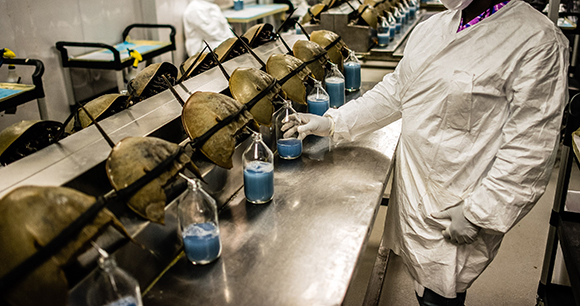A lawsuit filed earlier this year against pharmaceutical giant Charles River Laboratories alleges that the company is contributing to a significant decline in horseshoe crabs (listed as “vulnerable” on the IUCN Red List) and red knot shorebirds (listed as “near threatened”) in South Carolina. Charles River and three other US companies harvest crabs for their blood, which they use to produce a test that detects the presence of harmful bacteria in substances that are to be injected or placed inside a human or animal body (see AWI Quarterly, winter 2021).

The lawsuit, filed by the Southern Environmental Law Center, claims that the multibillion-dollar company keeps the crabs in overcrowded, unsanitary artificial containment ponds for many weeks without food before bleeding them, causing thousands to die. According to the complaint, when the company stopped keeping crabs in the ponds for one year in 2016, crab densities increased by 50 percent (after a steep five-year decline). Moreover, because the crabs are captured as they emerge from the ocean to spawn, containing them in ponds means they spawn in captivity rather than on the beach. This deprives red knots the opportunity to feed on the nutrient-rich eggs, which are critical to the birds’ survival on their 9,000-mile migratory journey.
Despite the legal troubles, Charles River shows no signs of slowing down: The company has recently been issued a new state permit allowing them to bleed crabs on Cape Cod. “Massachusetts horseshoe crab populations might not be able to withstand the expected increase in harvest,” said Mark Faherty, science coordinator at Mass Audubon, which surveys the Cape Cod horseshoe crab population. Decades ago, regulators at the Atlantic States Marine Fisheries Commission, which oversees the horseshoe crab industry, said they may consider taking action if the bleeding mortality rate in the United States exceeded 57,000 deaths per year—a threshold that has been surpassed almost every year since 2007. Defenders of Wildlife policy analyst Christian Hunt said that without better oversight of horseshoe crab bleedings and outcomes, “It’s the Wild West for the biomedical industry.”
The continued collection of horseshoe crabs is all the more troubling because an effective non-animal alternative test has been available since 2004 and approved for standard use in Europe since January 2021. In the United States, its approval has stalled in the face of vocal opposition from Charles River—which profits handsomely from its production of the crab blood–based test. The company claims the alternative test is not safe, and that they are in the process of developing their own synthetic version—but that it will take years before it will be ready.